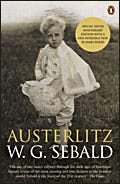Austerlitz is the surname of the central character in this subtle, extraordinary novel. It also refers to the 1805 battle in which Napoleon devastated the Austrian and Russian forces arrayed against him. There, Napoleon displayed his prowess as a tactician, feigning weakness to draw his enemies into a trap the brilliance of which they discovered too late to escape. So, with this novel, readers are drawn in before the full impact of the author's brilliance hits them.
In the narrator's travels in the late 1960s, he passes through an incongruously magnificent waiting room in Antwerp's central railway station, the "Salle des pas perdus," where he encounters a man who, uniquely, "was not staring apathetically into space, but instead was occupied in making notes and sketches" and taking photographs. This is Austerlitz, a scholar who, seemingly for no particular reason except to entertain and inform himself, has made a study of architecture, particularly public buildings and military fortresses, and especially—we later learn—the fortress erected in 1780 by the Hapsburg Emperor Joseph II in honor of his mother, Empress Maria Theresa. Photographs, like documentary evidence, are salted throughout the novel.
Austerlitz the man has a more personal and intriguing story which he begins to share with the narrator in disconnected memories of his younger years: a rucksack purchased in an army surplus store, "the only truly reliable thing in his life;" the anxiety provoked by a tale in a book of Bible stories for children, that of Moses's mother "who made an ark of bulrushes and daubed it with slime and with pitch, placed the child in the ark and laid it among the reeds by the side of the water."
To say much more would be to spoil the unfolding of the narrative, which gathers and darkens like a fall of twilight. Suffice it to say that Austerlitz's childhood in Wales during the 1940s is not where the boy's story truly begins. (2001, 298 pages. If you read an edition with James Wood's introduction, be forewarned that it tells too much of the story, but is worthwhile after you've read the novel.)




